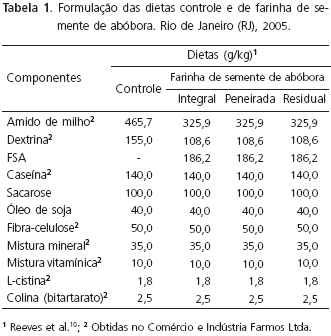OBJECTIVE: The aim of the present research was to evaluate the pumpkin (Cucurbita maxima, L.) seed flour effect on the rat glucose and lipid metabolism. METHODS: Twenty recent weaned male Wistar rats, divided in four groups, received for 10 days control and experimental diets containing whole, sifted and residual pumpkin seed flour on the rate of 30% of the total starch and dextrin in the control diet. All diets were isocaloric. Macronutrients and insoluble fiber were determined in the flours. All diets had their chemical composition calculated based on data from product labels, of food composition table and of the chemical analysis of the pumpkin seed flours. The animals´ growth and ingestion had been evaluated in 48 hours intervals. Blood samples drawn by cardiac puncture had their triacilglycerides, cholesterol and glucose levels measured by enzymatic methods. RESULTS: The pumpkin seed flour are good protein, lipids and, specially, dietary fiber sources.The animals' growth and food ingestion were similar along all the experiment (p>0.05). Glucose and triacilglycerides were significantly decreased in the groups taking diets with whole- and sifted-pumpkin seed flour respectively. CONCLUSION: Taking into account their properties chemistry and functional, it can be concluded that the pumpkin seed flour interfered in the rat metabolism decreasing significantly the serum glucose and triacilglycerides levels.
Flour; Dietary fiber; Lipid metabolism; Rats; Seeds




